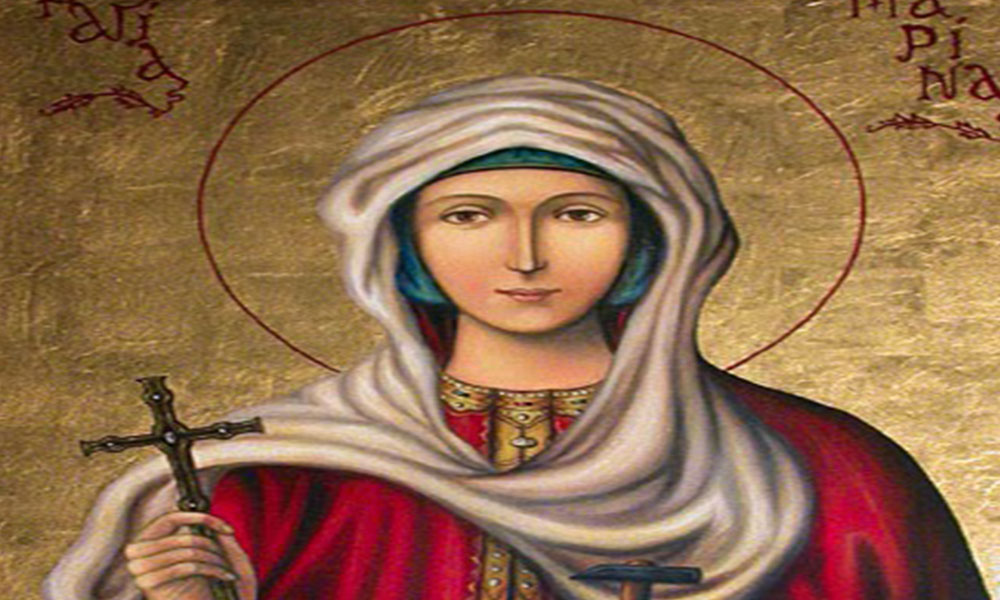Saint Marina the Maronite: Nun of Qannoubine and Hidden Witness of Faith
Elias Bejjani/July 17/2025
Liturgical Commemoration and Spiritual Significance
Today, our Maronite Church in Lebanon and throughout the world celebrates the annual feast of Saint Marina. With the fragrance of her holiness, we lift our prayers so that Lebanon may remain a land of saints, a refuge of freedom, and a living witness to the holiness of its Maronite people, who have always followed the Lord — even when it cost them everything, just like Marina, who offered herself fully on the altar of love and sacrifice.
Her Story of Faith and Sacrifice
Who is Marina, and what is her blessed story, shaped by faith, devotion, and holiness?
In the shining history of the Maronites, full of sacrifice and sanctity, the story of Saint Marina stands out. She chose to hide her womanhood in order to follow her divine calling. She became a rare example of spiritual courage and total self-denial for the sake of faith. Marina was born in the year 715 AD in the village of Qalamoun in northern Lebanon — a village that proudly gave birth to one of the greatest saints of the Maronite Church. Her spiritual journey later led her to the Qannoubine Monastery in the Holy Valley of Qadisha, where she lived a life of asceticism and deep prayer until her death.
The Vocation Begins
After her mother died, Marina’s father decided to dedicate his life to monasticism. But he was torn between his calling and his love for his only daughter. To his surprise, Marina refused marriage and asked to go with him to the monastery. With deep faith, she cut her hair, dressed as a man, took the name “Marinos,” and entered the monastery in Qadisha — the heart of Maronite spiritual life.
A Hidden Life of Holiness
Marina lived many silent years in the monastery. She prayed, served, and obeyed with humility and devotion. No one knew she was a woman. She lived in silence, fasting, and complete surrender to God.
But her path to sainthood was not free of trials and temptations. She was falsely accused of fathering a child born out of wedlock. She accepted the accusation without defending herself, believing it was part of the cross she was called to carry in love for Christ. She was expelled from the monastery and told to care for the child, which she did with love and patience, without ever revealing the truth.
Revelation After Death
Her secret was only discovered after her death, when her body was prepared for burial and her true identity as a woman was revealed. The monks were filled with sorrow and awe — they had judged her unjustly, not knowing the depth of her holiness. From that day on, Marina became a symbol of faith, humility, and silent strength for all who choose God above all else. Her father, who became a monk under the name “Augustine,” remained a witness to Marina’s extraordinary calling — she was not only his beloved daughter, but a saint born through pain and sacrifice.
A Legacy Honored by the Church
The Maronite Church celebrates her feast every year on July 17, honoring her as a holy nun and the patron saint of the historic Qannoubine Monastery, which still holds her memory and sacred legacy.
Symbol of Maronite Identity and Perseverance. Saint Marina is not only a personal example of holiness — she represents the soul of the Maronites, who throughout history kept their faith through persecution, built their nation of Lebanon, and made it a safe haven for the oppressed. Just like Qadisha Valley, just like Marina herself, Lebanon is a refuge of truth in the face of injustice — a sacred voice in a noisy world.
The Maronite Faith Across Time
There is no shadow of doubt that the deeply rooted faith of Saint Marina is, in general, the faith of the Maronites across time: fearless under accusation, unshaken by hardship, and seeking no earthly glory — only the face of God. Among them rose great saints like Saint Charbel, Saint Rafka, and Saint Nimatullah, who, among many others, made Lebanon a beacon of holiness and a sign of hope for those walking the path of salvation.
Conclusion: Lebanon, the Eternal Homeland of Saints
In conclusion, Lebanon — the land of holiness and saints — the homeland of Saint Marina and many righteous ones — is a country consecrated to God, eternal and unshakable. No matter how great the trials, temptations, and sacrifices may be, Lebanon will never fall. With God’s help, like the phoenix, it always rises from the ashes — full of life, faith, and blessings.













